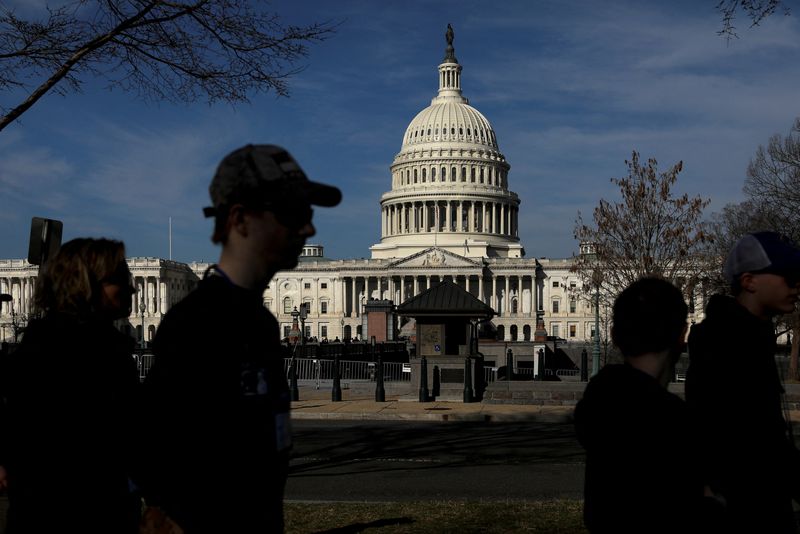By Patricia Zengerle and Richard Cowan
WASHINGTON – Many Democrats thought their control of the White House and Congress would provide an opportunity to rein in U.S. military spending, which had leaped 140% since 2000, and to beef up social programs they felt had been neglected.
Then Russian tanks rolled into Ukraine, bringing intense pressure to boost the Pentagon’s budget significantly, and not just for the coming year.
“The world did not cooperate,” said Democratic Senator Tim Kaine.
Congress this month passed an increase in defense spending of nearly 6%, a total expected to keep rising despite President Joe Biden’s withdrawal of U.S. forces from Afghanistan in August after 20 years of war. Kaine said Russia and China were both concerns.
“The switch of the primary threat from non-state terrorist organizations to nation-states – and two big ones – that’s going to require significant investment, and some retooling of investment,” Kaine told Reuters.
Defense cuts have always been a tough sell in Congress. Support for a powerful military is a traditional area of bipartisan agreement, while defense contractors exert strong influence as a leading-edge industry, major employers and campaign donors.
In his first year in office, Biden submitted a budget keeping Department of Defense spending basically flat. Congress backed an increase even before Russian President Vladimir Putin’s government invaded neighboring Ukraine last month.
Representative Adam Smith, chairman of the House Armed Services Committee, had hoped to tamp down what he saw as a bloated Pentagon budget. But he said in a speech at the American Enterprise Institute this month that had changed.
“The Russian invasion of Ukraine fundamentally altered what our national security posture and what our defense posture needs to be. It made it more complicated, and it made it more expensive,” he said.
Analysts, lawmakers and congressional aides said higher spending would likely continue even after the most urgent fears about Russian ambitions wear off.
“Never waste a crisis,” said Valerie Shen, director of the National Security program at Third Way, a center-left think tank in Washington. “Use it as an argument to get the policy position you always wanted anyway,” she said.
‘PERMANENT INCREASE’
NATO allies like Germany have increased their military spending in the past month. Washington is expected to keep spending more, to support any ongoing Ukrainian resistance and back up allies most exposed to Russian threats.
“I could see the United States increasing its presence in Europe. It could be a permanent increase in defense posture” or temporary deployments, said Todd Harrison, a defense budget analyst at the Center for Strategic and International Studies.
Biden is expected to announce his fiscal 2023 budget request on March 28.
Harrison speculated that Congress – which controls federal spending – could add $20 billion to $30 billion to whatever the Democratic president requests.
The 2023 total U.S. national defense budget will top $800 billion, giving U.S. arms makers a revenue tailwind after the COVID-19 pandemic choked supply chains for aerospace and microchips and hampered sales.
Senator Richard Shelby, the top Republican on the Senate Appropriations Committee, said it was too early to know the overall dollar amount Congress might settle upon for the military, especially given the fluid situation in Ukraine.
“We should never turn our back on people fighting for freedom,” he told Reuters in a hallway interview.
The Dow Jones U.S. Defense Index, which tracks shares of defense contractors, is up nearly 14% since Feb. 24, the day Russia invaded Ukraine, an action Moscow calls a “special operation.”
The largest U.S.-based defense contractors are Lockheed Martin, Raytheon Technologies, Boeing Co, Northrup Grumman and General Dynamics Corp..
For the last year, progressive Democrats had been pressuring party leaders to push for more spending on non-defense priorities such as battling climate change; helping lower-income families with childcare; and expanding healthcare for the elderly.
Lawmakers who want to tamp down military spending increases said they would not stop trying, although they were not optimistic.
Democratic Representative Jim McGovern, chairman of the powerful House Rules Committee and a member of the Progressive Caucus, said he supported Ukraine but not an endlessly expanding military budget.
“I would encourage us to take a more critical look at Pentagon spending in general. I think that’s separate and apart from what’s happening there (Ukraine),” he said as he left a speech to Congress last week by Ukrainian President Volodymyr Zelenskiy, whose appeal for more help left some lawmakers in tears.
(Reporting by Patricia Zengerle and Richard Cowan; Editing by Mary Milliken, Chris Sanders and David Gregorio)
